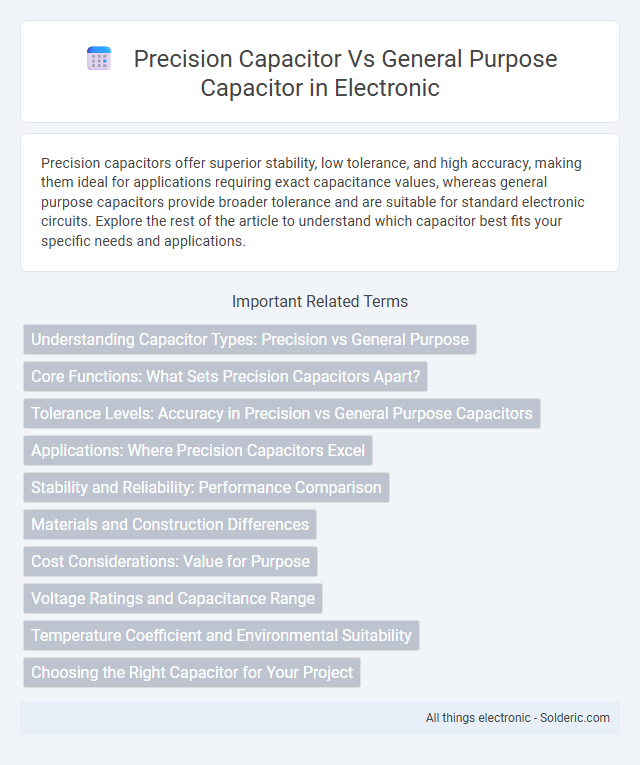Precision capacitors offer superior stability, low tolerance, and high accuracy, making them ideal for applications requiring exact capacitance values, whereas general purpose capacitors provide broader tolerance and are suitable for standard electronic circuits. Explore the rest of the article to understand which capacitor best fits your specific needs and applications.
Comparison Table
| Feature | Precision Capacitor | General Purpose Capacitor |
|---|---|---|
| Tolerance | +-0.1% to +-5% | +-10% to +-20% |
| Temperature Stability | High stability, low temperature coefficient | Moderate stability, higher temperature coefficient |
| Applications | High-accuracy circuits, filters, oscillators, measurement devices | General electronic circuits, power supplies, decoupling |
| Dielectric Material | Ceramic (C0G/NP0), Tantalum, Film | Ceramic (X7R, Y5V), Electrolytic |
| Cost | Higher cost due to precision and materials | Lower cost, mass-produced |
| Size | Smaller size for the same capacitance with tighter specs | Varies, generally larger for equivalent capacitance |
| Stability Over Time | Excellent long-term stability | Moderate to low long-term stability |
| Equivalent Series Resistance (ESR) | Low ESR for better performance | Higher ESR, less efficient at high frequencies |
Understanding Capacitor Types: Precision vs General Purpose
Precision capacitors offer superior accuracy, stability, and low tolerance levels, making them ideal for applications requiring exact capacitance values, such as measurement instruments and high-frequency circuits. General purpose capacitors provide cost-effective performance with broader tolerance ranges suited for everyday electronic devices, power supplies, and signal filtering where perfect accuracy is not critical. Selecting between these types depends on the application's sensitivity to capacitance variation and the required consistency under varying environmental conditions.
Core Functions: What Sets Precision Capacitors Apart?
Precision capacitors differ from general purpose capacitors through their exceptional accuracy, stability, and low tolerance levels, which ensure consistent performance in critical applications such as instrumentation and measurement devices. Their core functions emphasize minimal capacitance variation over temperature, voltage, and time, making them ideal for circuits requiring exact frequency response or timing accuracy. Your choice of a precision capacitor guarantees enhanced reliability where precise electrical characteristics are essential.
Tolerance Levels: Accuracy in Precision vs General Purpose Capacitors
Precision capacitors offer extremely tight tolerance levels, often as low as +-0.1% to +-1%, ensuring consistent capacitance values in critical applications. General purpose capacitors typically have wider tolerance ranges, commonly between +-10% and +-20%, suitable for less sensitive electronic circuits. The superior accuracy of precision capacitors minimizes component variability, enhancing overall circuit stability and performance.
Applications: Where Precision Capacitors Excel
Precision capacitors excel in applications requiring high stability, low tolerance, and minimal temperature coefficient, such as in medical devices, aerospace instruments, and precision measurement equipment. Their superior accuracy ensures reliable performance in calibration circuits, timing devices, and filtering tasks where general purpose capacitors may introduce unwanted variability. Your choice of precision capacitors enhances circuit fidelity and consistency in environments demanding exact electrical characteristics.
Stability and Reliability: Performance Comparison
Precision capacitors exhibit superior stability and reliability compared to general purpose capacitors due to their low tolerance levels, minimal temperature coefficient, and advanced dielectric materials. These capacitors maintain consistent capacitance values under varying environmental conditions, reducing drift and ensuring long-term performance accuracy in critical applications. General purpose capacitors, while more economical, often display higher capacitance variation and reduced lifespan when subjected to thermal or mechanical stress.
Materials and Construction Differences
Precision capacitors utilize high-quality dielectric materials such as polypropylene or Teflon, featuring tightly controlled thickness and uniformity to achieve stable capacitance and low dielectric absorption. Their construction often includes hermetic seals and metalized film electrodes designed to minimize parasitic inductance and resistive losses. In contrast, general purpose capacitors typically use lower-grade dielectrics like ceramic or electrolytic materials with less stringent manufacturing tolerances, resulting in higher variability and less stable electrical characteristics.
Cost Considerations: Value for Purpose
Precision capacitors offer superior stability, low tolerance, and minimal temperature drift, making them ideal for applications requiring high accuracy, but they come at a higher cost compared to general purpose capacitors. General purpose capacitors provide cost-effective solutions for everyday applications where tight specifications and performance consistency are less critical. You should weigh the increased expense of precision capacitors against the performance benefits to determine the best value for your specific project needs.
Voltage Ratings and Capacitance Range
Precision capacitors offer higher voltage ratings typically ranging from 50V to several kilovolts, ensuring reliability in circuits requiring stable performance under varying electrical stress. Their capacitance range is narrowly defined and tightly controlled, often between picofarads to microfarads, to provide accurate, predictable values for sensitive applications. In contrast, general purpose capacitors cover a broader capacitance range and have lower voltage ratings, usually up to 250V, designed for less demanding, everyday electronic circuits.
Temperature Coefficient and Environmental Suitability
Precision capacitors offer superior temperature coefficient stability, typically ranging from +-10 ppm/degC to +-30 ppm/degC, ensuring minimal capacitance variation in fluctuating temperatures, unlike general purpose capacitors which can have coefficients up to +-250 ppm/degC. These capacitors are designed to maintain performance in harsh environmental conditions such as high humidity, vibration, and temperature extremes, making them ideal for critical applications requiring consistent accuracy. Your choice of capacitor significantly impacts circuit reliability when temperature stability and environmental resilience are priorities.
Choosing the Right Capacitor for Your Project
Precision capacitors offer tighter tolerance and superior stability compared to general purpose capacitors, making them ideal for applications requiring high accuracy and low signal distortion. General purpose capacitors provide cost-effective solutions with broader tolerance ranges suitable for less critical, standard circuit functions. Choosing the right capacitor for your project depends on balancing performance needs with budget constraints, ensuring optimal reliability and efficiency.
precision capacitor vs general purpose capacitor Infographic

 solderic.com
solderic.com